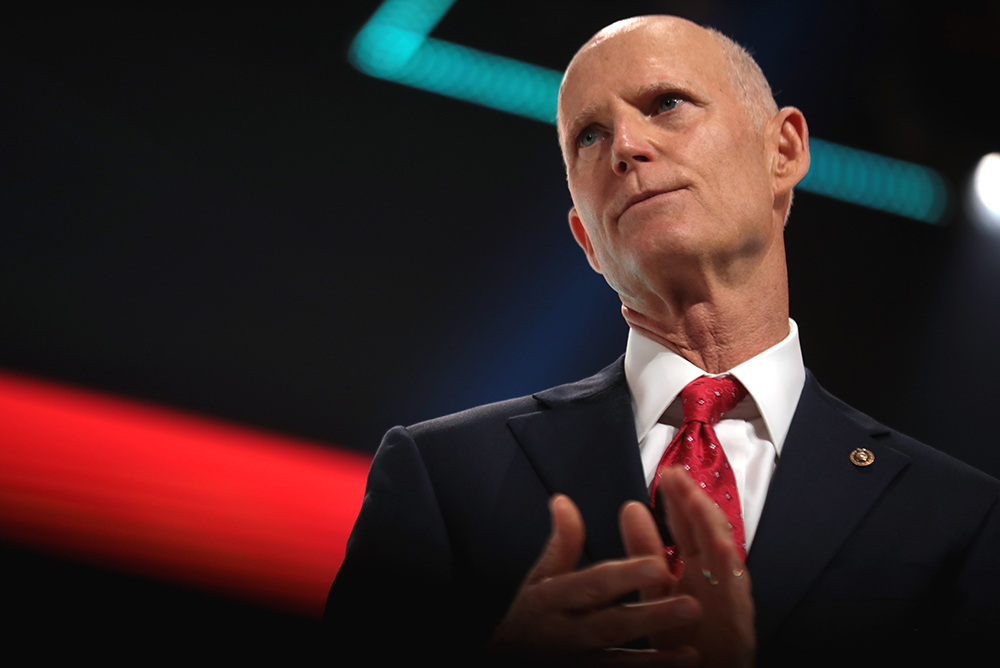
Sen. Rick Scott, R-Florida, speaks at the Student Action Summit hosted by Turning Point USA in Tampa, Florida, July 17, 2021. (Wikimedia Commons/Gage Skidmore)
The Democratic Party has received a lifeline as it approaches what otherwise appears to be the grimmest of prospects for maintaining their majorities in both houses of Congress. And that lifeline has been tossed to them by Sen. Rick Scott of Florida, who is head of the National Republican Senatorial Committee, the party arm tasked with electing more GOP senators.
Taking a page from the Steve Bannon "grand, disruptive" playbook and combining it with Sarah Palin's "maverick" pitch, Scott has proposed upending traditional ideas about how to win a midterm election. The plan violates GOP orthodoxy by calling for an increase in taxes. And it touches the third rail of politics, entitlement spending, by setting an expiration date on all laws, including the law that structures Social Security and Medicare.
The plan touches on other national priorities such as education, crime and national defense and most of it reads like a word salad. "We will not allow political or social indoctrination in our schools. Teachers who refuse to comply will need to find new jobs," reads one of the bullet points in the page on education.
I'm not sure how else you would characterize the educational policies of his successor in the governor's mansion in Tallahassee as anything other than "political indoctrination," but I suppose beauty is in the eye of the beholder.
It is hard not to recognize the internal contradiction in this bullet point: "We will reject both the roots and the adherents of cancel culture in America." Isn't that canceling cancel culture? Odd, too, that this particular point was found on the most strangely named of the 11 pages in the plan, "Religious Liberty/Big Tech." What is that about?
It is not clear if Scott, or anyone on his staff, worried that calling the section on foreign policy "America First" had a fascist ring to it. Maybe it was intentional? Maybe just ignorant?
The former governor of Florida is unapologetic. "My whole life has been people telling me that, you know, you're doing it the wrong way. You can't, you shouldn't be doing this," he said in a recent interview with The Washington Post. "I've been up here for three years. Do you know how many people have come to me and asked me, before they vote, what my opinion is on something and whether it's good for my state? That would be zero."
Advertisement
When Scott first released his "Rescue America" plan, presenting it as an outline by which the GOP could retake the Senate, the plan "fell flat" with many of his Republican colleagues.
Senate Republican Leader Mitch McConnell piled on a week later, telling a press conference, "Let me tell you what will not be a part of our agenda: We will not have as part of our agenda a bill that raises taxes on half the American people and sunsets Social Security and Medicare after five years. That will not be part of the Republican Senate majority agenda."
Critics within the ranks of the GOP complain Scott is using the National Republican Senatorial Committee to advance his own ambitions. They call the organization the "National Rick Scott Committee."
I suspect the senator's ideas are more deeply seated. He, like Donald Trump, really thinks the rules should not apply to him and that he can get away with almost anything. When the company he led committed what was, at the time, the largest case of Medicare fraud in history, he departed with $300 million in stock, the company had to pay the government a $1.7 billion fine, and yet he went on to win the governorship of Florida with its millions of Medicare recipients. Of course he thinks he is made of Teflon.
The White House pounced on Scott's plan, releasing a "Fact Sheet" on Monday when everyone's taxes were due, comparing the Scott plan with the president's. "The President is fighting for tax cuts for the middle class and to ensure that the super wealthy and large corporations pay their fair share, while Congressional Republicans, led by Senator Scott, are proposing big tax increases on middle-class families," the statement said.
If only the president could get Sens. Joe Manchin and Kyrsten Sinema on board, and actually pass his tax provisions, the difference between the two parties would be seen as real, not rhetorical.
Paul Krugman recognized the clarifying quality of the Scott plan. "So everything suggests that the Republican Party is as pro-wealthy, anti-worker as ever," he wrote. "Unlike right-wing European parties, it hasn't made any gestures toward actual populism. Why? The answer, presumably, is that the G.O.P. caters to plutocrats, even as it attacks 'elites,' because it thinks it can."
Scott has given the Democrats a gift. So often accused of being in the pocket of elites, especially on hot-button issues that consume a lot of attention and heat, the Democrats need to find a way to connect with the average voter.
On Monday, that average voter paid his or her taxes, mindful that many of America's oligarchs paid little or no taxes on their vast wealth. If the Democrats can remind that voter that they think the rich should be paying more while the Republicans are in the pocket of the oligarchs, they just might be able to keep the November midterm from turning into a rout.








